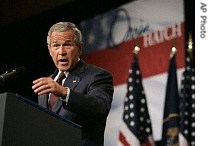2006年VOA标准英语-Bush Sets Republican Agenda for Congressional E(在线收听)
By Scott Stearns
White House
01 September 2006
With less than 70 days to go before legislative elections, President Bush is campaigning hard for Republican candidates facing challenges from opposition Democrats, who hope to capture control of at least one house of Congress. The president is campaigning on the issues that won him re-election two years ago - national security and the threat of terrorism.
-------
 President Bush gestures during a fundraiser for the reelection campaign of Sen Orrin Hatch |
||
So, President Bush is back on the campaign trail, trying to help his party's congressional candidates keep control of both houses of Congress. Not surprisingly, he is using many of the same themes that won him re-election two years ago.
Speaking to Republican supporters in the southern state of Tennessee this past week, the president said their party offers voters a positive vision that makes a difference in the lives of all Americans.
"I bring a message of optimism to you," said Mr. Bush. "I believe, and I know our party is a political party that trusts the wisdom of the American people. Ours is a party that is willing to confront challenges, instead of passing them on to future generations."
Mr. Bush says the most important challenge is securing the nation against another terrorist attack. Many opposition Democrats have been critical of some of the measures the president has taken in the name of national security. They include the surveillance of suspect telephone conversations without a warrant, and endorsing the so-called Patriot Act, which critics say impinges on civil liberties.
Mr. Bush is trying to turn that opposition to political advantage for Republicans, arguing some of his critics do not understand the depth of the terrorist threat.
"I need people in Washington, D.C. who are willing to give those who are responsible for protecting America all the tools they need, tools such as the Patriot Act, tools such as programs that say, if al-Qaida is calling into the United States, we want to know why," added Mr. Bush.
Opposition Democrats are focusing on what the president calls the central front in the fight against terrorism: Iraq. While a majority of Americans now believe it was a mistake to send U.S. troops to topple Saddam Hussein, nearly two-thirds of Republicans still approve of the way President Bush is handling the war in Iraq.
Critics say continued U.S. involvement in Iraq is distracting from the broader fight against terrorism, drawing resources away from enhanced border security and the hunt for al-Qaida leader Osama bin Laden.
President Bush says the security of the civilized world is at stake in Iraq. While he says he welcomes debate over the war, the president told Republican supporters in the southwest state of Utah that a debate over national security is one they can win.
"In these 2006 campaigns, there will be a lot of debate," he explained. "There will be people, good people, decent people, patriotic people, who say, now is the time to leave Iraq, and they are wrong."
On the campaign trail, the president is also talking more about social issues that mobilize conservative voters, including the selection of conservative judges and federal support for religious-based charities, which critics say blurs the separation of church and state.
Mr. Bush says candidates need to explain that many of America's social problems require something greater than government, namely the help of people, who, he says, hear a higher calling from God.
"America can change one heart, and one soul, and one conscience at a time," said Mr. Bush. "Government should not fear faith. Government ought to welcome the good works of faith-based and community-based organizations to help make this country as strong as it possibly can be."
White House officials say the president will continue to campaign aggressively for Republican candidates in the November election, as a switch of just six seats in the Senate would put Democrats in control of that chamber for the first time since 2002.
That outcome would likely end any chance the president has of achieving substantive legislative goals in his second term, as many Democrats say they would use control of the Senate to investigate the president's handling of the war in Iraq.